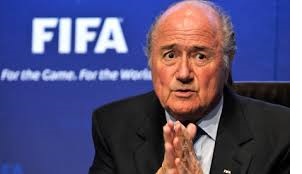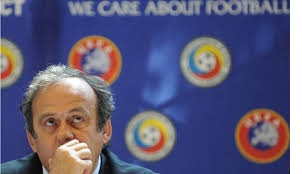Introduction: FIFA’s TPO ban and its compatibility with EU competition law.
Day 1: FIFA must regulate TPO, not ban it.
Day 3: The Impact of the TPO Ban on South American Football.
Day 4: Third Party Investment from a UK Perspective.
Day 5: Why FIFA's TPO ban is justified.
Editor’s note: Raffaele
Poli is a human geographer. Since 2002, he has studied the labour and transfer
markets of football players. Within the context of his PhD thesis
on the transfer networks of African footballers, he set up the CIES Football Observatory based
at the International Centre for Sports Studies (CIES) located in Neuchâtel,
Switzerland. Since 2005, this research group
develops original research in the area of football from a multidisciplinary
perspective combining quantitative and qualitative methods. Raffaele was also involved in a recent study on TPO providing FIFA with more background information on its functioning and regulation (the executive summary is available here).
This is the third blog of our Symposium
on FIFA’s TPO ban, it is meant to provide an interdisciplinary view on the
question. Therefore, it will venture beyond the purely legal aspects of the ban
to introduce its social, political and economical context and the related
challenges it faces. More...
Introduction: FIFA’s TPO ban and its compatibility with EU competition law.
Day 2: Third-party entitlement to shares of transfer fees: problems and solutions
Day 3: The Impact of the TPO Ban on South American Football.
Day 4: Third Party Investment from a UK Perspective.
Day 5: Why FIFA's TPO ban is justified.
Editor's note: This is the first blog of our symposium on FIFA's TPO ban, it features the position of La Liga regarding the ban and especially highlights some alternative regulatory measures it would favour. La Liga has launched a complaint in front of the European Commission challenging the compatibility of the ban with EU law, its ability to show that realistic less restrictive alternatives were available is key to winning this challenge. We wish to thank La Liga for sharing its legal (and political) analysis of FIFA's TPO ban with us.
INTRODUCTION
The Spanish Football League (La Liga) has argued for months that the funding of clubs through the conveyance of part of players' economic rights (TPO) is a useful practice for clubs. However, it also recognized that the
practice must be strictly regulated. In July 2014, it approved a provisional regulation that was sent to many of the relevant stakeholders, including FIFA’s Legal Affairs Department. More...
Day 1: FIFA must regulate TPO, not ban it.
Day 2: Third-party entitlement to shares of transfer fees: problems and solutions
Day 3: The Impact of the TPO Ban on South American Football.
Day 4: Third Party Investment from a UK Perspective.
Day 5: Why FIFA's TPO ban is justified.
On
22 December 2014, FIFA officially introduced
an amendment to its Regulations on the Status and Transfers of Players banning third-party ownership of players’
economic rights (TPO) in football. This decision to put a definitive end to the
use of TPO in football is controversial, especially in countries where
TPO is a mainstream financing mechanism for clubs, and has led the Portuguese
and Spanish football leagues to launch a complaint in front of the European
Commission, asking it to find the FIFA ban contrary to EU competition law.
Next week, we will feature a Blog Symposium
discussing the FIFA TPO ban and its compatibility with EU competition law. We
are proud and honoured to welcome contributions from both the complainant (the
Spanish football league, La Liga) and the defendant (FIFA) and three renowned
experts on TPO matters: Daniel Geey ( Competition lawyer at Fieldfisher, aka @FootballLaw), Ariel Reck (lawyer at
Reck Sports law in Argentina, aka @arielreck)
and Raffaele Poli (Social scientist and head of the CIES Football Observatory). The
contributions will focus on different aspects of the functioning of TPO and on
the impact and consequences of the ban. More...
On 21 January 2015, the Court of
arbitration for sport (CAS) rendered its award in the latest avatar of the Mutu case, aka THE sports law case that
keeps on giving (this decision might still be appealed to the Swiss Federal
tribunal and a complaint by Mutu is still pending in front of the European
Court of Human Right). The decision was finally published on the CAS website on
Tuesday. Basically, the core question focuses on the interpretation of Article
14. 3 of the FIFA Regulations on the Status and
Transfer of Players in its 2001 version. More precisely, whether, in case of a dismissal of a player
(Mutu) due to a breach of the contract without just cause by the
player, the new club (Juventus and/or Livorno) bears the duty to pay the
compensation due by the player to his former club (Chelsea). Despite winning maybe
the most high profile case in the history of the CAS, Chelsea has been desperately
hunting for its money since the rendering of the award (as far as the US), but
it is a daunting task. Thus, the English football club had the idea to turn
against Mutu’s first employers after his dismissal in 2005, Juventus and
Livorno, with success in front of the FIFA Dispute Resolution Chamber (DRC),
but as we will see the CAS decided otherwise[1]. More...
The world of professional cycling and doping have been closely intertwined
for many years. Cycling’s International governing Body, Union Cycliste
Internationale (UCI), is currently trying to clean up the image of the sport
and strengthen its credibility. In order to achieve this goal, in January 2014
the UCI established the Cycling Independent Reform Commission (CIRC) “to conduct a wide ranging independent investigation
into the causes of the pattern of doping that developed within cycling and allegations
which implicate the UCI and other governing bodies and officials over
ineffective investigation of such doping practices.”[1] The final report was submitted to the
UCI President on 26 February 2015 and published on the UCI website on 9 March 2015. The report
outlines the history of the relationship between cycling and doping throughout
the years. Furthermore, it scrutinizes the role of the UCI during the years in
which doping usage was at its maximum and addresses the allegations made
against the UCI, including allegations of corruption, bad governance, as well
as failure to apply or enforce its own anti-doping rules. Finally, the report turns
to the state of doping in cycling today, before listing some of the key practical
recommendations.[2]
Since the day of publication, articles and commentaries (here and here) on the report have been burgeoning and many
of the stakeholders have expressed their views (here and here). However, given the fact that the report is
over 200 pages long, commentators could only focus on a limited number of
aspects of the report, or only take into account the position of a few
stakeholders. In the following two blogs we will try to give a comprehensive
overview of the report in a synthetic fashion.
This first blogpost will focus on the relevant findings and
recommendations of the report. In continuation, a second blogpost will address
the reforms engaged by the UCI and other long and short term consequences the
report could have on professional cycling. Will the recommendations lead to a
different governing structure within the UCI, or will the report fundamentally
change the way the UCI and other sport governing bodies deal with the doping
problem? More...
It took only days for the de facto immunity of the Court of
Arbitration for Sport (CAS) awards from State court interference to collapse
like a house of cards on the grounds
of the public policy exception mandated under Article V(2)(b) of the New York Convention on the Recognition and
Enforcement of Foreign Arbitral Awards . On 15 January 2015, the
Munich Court of Appeals signalled an unprecedented turn in the
longstanding legal dispute between the German speed skater, Claudia Pechstein,
and the International Skating Union (ISU). It refused to recognise a CAS
arbitral award, confirming the validity of a doping ban, on the grounds that it
violated a core principle of German cartel law which forms part of the German public
policy. A few weeks before, namely on 30 December 2014, the Court of Appeal of Bremen held a CAS award, which ordered the German Club, SV Wilhelmshaven, to
pay ‘training compensation’, unenforceable for non-compliance with mandatory
European Union law and, thereby, for violation of German ordre public. More...
'Can't fight corruption with con tricks
They use the law to commit crime
And I dread, dread to think what the future
will bring
When we're living in gangster time'
The Specials - Gangsters
The pressing need for change
The
Parliamentary Assembly (PACE) of the Council of Europe (CoE), which is composed
of 318 MPs chosen from the national parliaments of the 47 CoE member states,
unanimously adopted a report entitled ‘the reform of
football’
on January 27, 2015. A draft resolution on the report will be debated during the
PACE April 2015 session and, interestingly, (only?) FIFA’s president Sepp
Blatter has been sent an invitation.
The PACE report
highlights the pressing need of reforming the governance
of football by FIFA and UEFA respectively. Accordingly, the report contains
some interesting recommendations to improve FIFA’s (e.g., Qatargate[1]) and
UEFA’s governance (e.g., gender representation). Unfortunately, it remains unclear
how the report’s recommendations will actually be implemented and enforced.
The report is a
welcomed secondary effect of the recent Qatargate directly involving former
FIFA officials such as Jack Warner, Chuck Blazer, and Mohamed Bin Hammam[2] and
highlighting the dramatic failures of FIFA’s governance in putting its house in
order. Thus, it is undeniably time to correct the governance of football by FIFA
and its confederate member UEFA – nolens
volens. The real question is how to do it.


Photograph:
Fabrice Coffrini/AFP/Getty Images Photograph:
Octav Ganea/AP
More...
Due
to the legitimate excitement over the recent Pechstein
ruling, many have overlooked a previous German decision
rendered in the Wilhelmshaven SV case
(the German press did report on the decision here
and here).
The few academic commentaries (see here
and here)
focused on the fact that the German Court had not recognized the res judicata effect of a CAS award.
Thus, it placed Germany at the spearhead of a mounting rebellion against the legitimacy
of the CAS and the validity of its awards. None of the commentators weighed in
on the substance of the decision, however. Contrary to the Court in Pechstein, the judges decided to evaluate
the compatibility of the FIFA rules on training compensations with the EU free
movement rights. To properly report on the decision and assess the threat it
may constitute for the FIFA training compensation system, we will first
summarize the facts of the case (I), briefly explicate the mode of functioning
of the FIFA training compensation system (II), and finally reconstruct the
reasoning of the Court on the compatibility of the FIFA rules with EU law
(III).More...
On 15
April 2014, the Cairo Economic Court (the “Court") issued a seminal
judgment declaring the broadcasting of a football match a sovereign act of State.[1]
Background
In Al-Jazeera
v. the Minister of Culture, Minister of Information, and the Chairman of the
Board of Directors of the Radio and Television Union, a case registered
under 819/5JY, the Al-Jazeera TV Network (the “Plaintiff” or “Al-Jazeera”)
sued the
Egyptian Radio and Television Union (“ERTU” or the “Union”) et
al. (collectively, the “Respondents”) seeking compensation for
material and moral damages amounting to three (3) million USD, in addition to
interest, for their alleged breach of the Plaintiff’s exclusive right to
broadcast a World Cup-qualification match in Egypt. Al-Jazeera obtained such
exclusive right through an agreement it signed with Sportfive, a sports marketing company that had
acquired the
right to broadcast Confederation of African Football (“CAF”) World
Cup-qualification matches.
ERTU
reportedly broadcasted the much-anticipated match between Egypt and Ghana live on
15 October 2013 without obtaining Al-Jazeera’s written approval, in violation
of the Plaintiff’s intellectual property rights.
More...